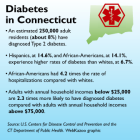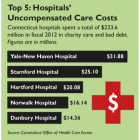Affordable Care Act
Diabetes Takes Disproportionate Toll On Hispanics And Blacks
|
Connecticut’s diabetes rate ranks lower than the national average, but Hispanics and African-Americans are more than twice as likely to have the disease compared with their white neighbors and are at greater risk of dying from diabetes-related causes. Approximately 250,000 Connecticut adults (8 percent) have been diagnosed with Type 2 diabetes and an estimated 83,000 state residents don’t realize they have the disease, according to 2011-13 data from the U.S. Centers for Disease Control and Prevention (CDC). Nationally, 29.1 million people (9.3 percent) have diabetes and 8.1 million people don’t know they have the disease, reports the CDC. Connecticut’s Hispanics (14.6 percent) and African-Americans (14.1 percent) have significantly higher rates of diabetes than whites (6.7 percent). In addition, adults with annual household incomes below $25,000 are 2.3 times more likely to have diagnosed diabetes compared with adults with household incomes over $75,000, according to the CDC.



